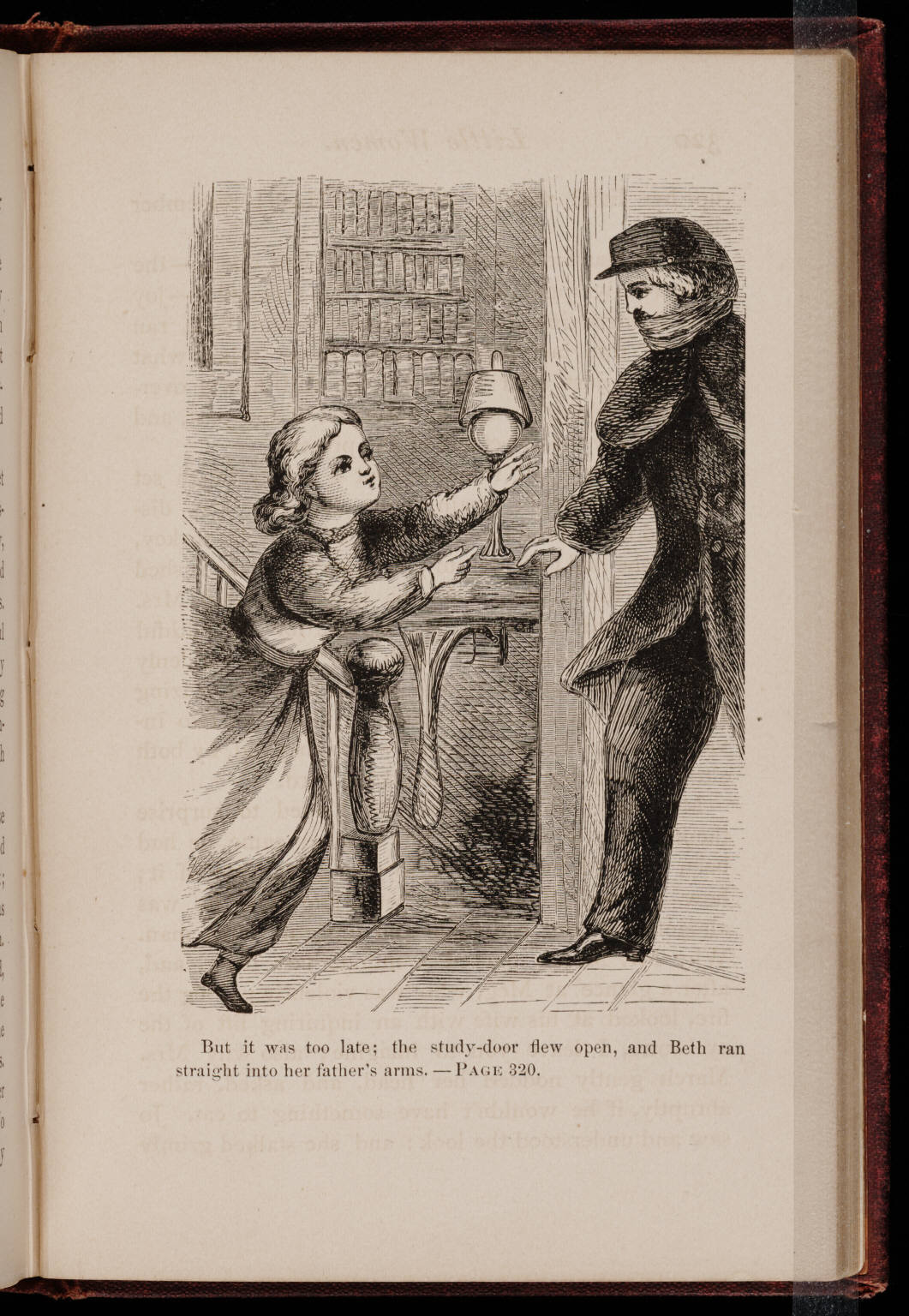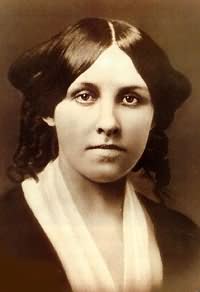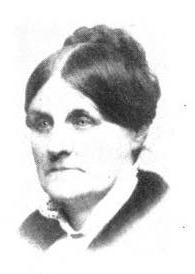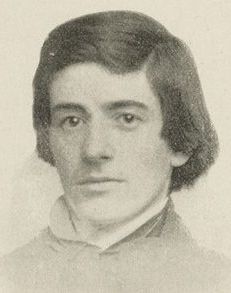|
Elizabeth Sewall Alcott
Elizabeth Sewall "Lizzie" Alcott (June 24, 1835 – March 14, 1858) was one of the two younger sisters of Louisa May Alcott. She was born in 1835 and died at the age of 22 from scarlet fever. Biography She was originally named Elizabeth ''Peabody'' Alcott in honor of her father Bronson's teaching assistant at the Temple School and close friend of her mother, Abba. By age three, however, after a falling out between Bronson and Elizabeth Peabody, her name was changed to Elizabeth ''Sewall'' Alcott, after her mother's mother, Dorothy Sewall May. In her semi-autobiographical novel, ''Little Women'' (1868), Louisa May Alcott represented her sister as Beth. She wrote: In 1856, Lizzie contracted scarlet fever while helping a poor German family. Although she recovered, she was permanently weakened. Her father Bronson was on a tour of the Western United States and had reached as far as Cincinnati when he heard that Lizzie, known to be ill, had taken a turn for the worse. By February ... [...More Info...] [...Related Items...] OR: [Wikipedia] [Google] [Baidu] |
Louisa May Alcott
Louisa May Alcott (; November 29, 1832March 6, 1888) was an American novelist, short story writer, and poet best known as the author of the novel ''Little Women'' (1868) and its sequels ''Little Men'' (1871) and ''Jo's Boys'' (1886). Raised in New England by her Transcendentalism, transcendentalist parents, Abigail May and Amos Bronson Alcott, she grew up among many well-known intellectuals of the day, such as Ralph Waldo Emerson, Nathaniel Hawthorne, Henry David Thoreau, and Henry Wadsworth Longfellow. Alcott's family suffered from financial difficulties, and while she worked to help support the family from an early age, she also sought an outlet in writing. She began to receive critical success for her writing in the 1860s. Early in her career, she sometimes used pen names such as A. M. Barnard, under which she wrote lurid short stories and sensation novels for adults that focused on passion and revenge. Published in 1868, ''Little Women'' is set in the Alcott family home, Or ... [...More Info...] [...Related Items...] OR: [Wikipedia] [Google] [Baidu] |
Henry David Thoreau
Henry David Thoreau (July 12, 1817May 6, 1862) was an American naturalist, essayist, poet, and philosopher. A leading Transcendentalism, transcendentalist, he is best known for his book ''Walden'', a reflection upon simple living in natural surroundings, and his essay "Civil Disobedience (Thoreau), Civil Disobedience" (originally published as "Resistance to Civil Government"), an argument for disobedience to an unjust state. Thoreau's books, articles, essays, journals, and poetry amount to more than 20 volumes. Among his lasting contributions are his nature writing, writings on natural history and philosophy, in which he anticipated the methods and findings of ecology and environmental history, two sources of modern-day environmentalism. His literary language, literary style interweaves close observation of nature, personal experience, pointed rhetoric, symbolic meanings, and historical lore, while displaying a poetic sensibility, philosophical Asceticism, austerity, and attent ... [...More Info...] [...Related Items...] OR: [Wikipedia] [Google] [Baidu] |
Deaths From Streptococcus Infection
Death is the irreversible cessation of all biological functions that sustain an organism. For organisms with a brain, death can also be defined as the irreversible cessation of functioning of the whole brain, including brainstem, and brain death is sometimes used as a legal definition of death. The remains of a former organism normally begin to decompose shortly after death. Death is an inevitable process that eventually occurs in almost all organisms. Death is generally applied to whole organisms; the similar process seen in individual components of an organism, such as cells or tissues, is necrosis. Something that is not considered an organism, such as a virus, can be physically destroyed but is not said to die. As of the early 21st century, over 150,000 humans die each day, with ageing being by far the most common cause of death. Many cultures and religions have the idea of an afterlife, and also may hold the idea of judgement of good and bad deeds in one's life ( h ... [...More Info...] [...Related Items...] OR: [Wikipedia] [Google] [Baidu] |
People From Concord, Massachusetts
A person ( : people) is a being that has certain capacities or attributes such as reason, morality, consciousness or self-consciousness, and being a part of a culturally established form of social relations such as kinship, ownership of property, or legal responsibility. The defining features of personhood and, consequently, what makes a person count as a person, differ widely among cultures and contexts. In addition to the question of personhood, of what makes a being count as a person to begin with, there are further questions about personal identity and self: both about what makes any particular person that particular person instead of another, and about what makes a person at one time the same person as they were or will be at another time despite any intervening changes. The plural form "people" is often used to refer to an entire nation or ethnic group (as in "a people"), and this was the original meaning of the word; it subsequently acquired its use as a plural form of per ... [...More Info...] [...Related Items...] OR: [Wikipedia] [Google] [Baidu] |
1858 Deaths
Events January–March * January – **Benito Juárez (1806–1872) becomes Liberal President of Mexico. At the same time, conservatives install Félix María Zuloaga (1813–1898) as president. **William I of Prussia becomes regent for his brother, Frederick William IV, who had suffered a stroke. * January 9 ** British forces finally defeat Rajab Ali Khan of Chittagong ** Anson Jones, the last president of the Republic of Texas, commits suicide. * January 14 – Orsini affair: Felice Orsini and his accomplices fail to assassinate Napoleon III in Paris, but their bombs kill eight and wound 142 people. Because of the involvement of French émigrés living in Britain, there is a brief anti-British feeling in France, but the emperor refuses to support it. * January 25 – The ''Wedding March'' by Felix Mendelssohn becomes a popular wedding recessional, after it is played on this day at the marriage of Queen Victoria's daughter Victoria, Princess Royal, to Princ ... [...More Info...] [...Related Items...] OR: [Wikipedia] [Google] [Baidu] |
1835 Births
Events January–March * January 7 – anchors off the Chonos Archipelago on her second voyage, with Charles Darwin on board as naturalist. * January 8 – The United States public debt contracts to zero, for the only time in history. * January 24 – Malê Revolt: African slaves of Yoruba Muslim origin revolt in Salvador, Bahia. * January 26 – Queen Maria II of Portugal marries Auguste de Beauharnais, 2nd Duke of Leuchtenberg, in Lisbon; he dies only two months later. * January 26 – Saint Paul's in Macau largely destroyed by fire after a typhoon hits. * January 30 – An assassination is attempted against United States President Andrew Jackson in the United States Capitol (the first assassination attempt against a President of the United States). * February 1 – Slavery is abolished in Mauritius. * February 20 – 1835 Concepción earthquake: Concepción, Chile, is destroyed by an earthquake; the resulting tsunami destroys the neighboring city of Talcahua ... [...More Info...] [...Related Items...] OR: [Wikipedia] [Google] [Baidu] |
Alcott Family
Amos Bronson Alcott (; November 29, 1799 – March 4, 1888) was an American teacher, writer, philosopher, and reformer. As an educator, Alcott pioneered new ways of interacting with young students, focusing on a conversational style, and avoided traditional punishment. He hoped to perfect the human spirit and, to that end, advocated a plant-based diet. He was also an abolitionist and an advocate for women's rights. Born in Wolcott, Connecticut in 1799, Alcott had only minimal formal schooling before attempting a career as a traveling salesman. Worried that the itinerant life might have a negative impact on his soul, he turned to teaching. His innovative methods, however, were controversial, and he rarely stayed in one place very long. His most well-known teaching position was at the Temple School in Boston. His experience there was turned into two books: ''Records of a School'' and ''Conversations with Children on the Gospels''. Alcott became friends with Ralph Waldo Emers ... [...More Info...] [...Related Items...] OR: [Wikipedia] [Google] [Baidu] |
Sleepy Hollow Cemetery (Concord, Massachusetts)
Sleepy Hollow Cemetery is a rural cemetery located on Bedford Street near the center of Concord, Massachusetts. The cemetery is the burial site of a number of famous Concordians, including some of the United States' greatest authors and thinkers, especially on a hill known as "Authors' Ridge." History Sleepy Hollow was designed in 1855 by noted landscape architects Cleveland and Copeland, and has been in use ever since. It was dedicated on September 29, 1855; Ralph Waldo Emerson gave a dedication speech and would be buried there decades later. Both designers of the cemetery had decades-long friendships with many leaders of the Transcendentalism movement and is reflected in their design. "Sleepy Hollow was an early natural garden designed in keeping with Emerson's aesthetic principles," writes Joachim Wolschke-Bulmahn in his ''Nature and Ideology''. In 1855, landscape designer Robert Morris Copeland delivered an address he entitled ''The Usefull icand The Beautiful'', tying h ... [...More Info...] [...Related Items...] OR: [Wikipedia] [Google] [Baidu] |
Pallbearer
A pallbearer is one of several participants who help carry the casket at a funeral. They may wear white gloves in order to prevent damaging the casket and to show respect to the deceased person. Some traditions distinguish between the roles of pallbearers and casket bearer. The former is a ceremonial position, carrying a tip of the pall or a cord attached to it. The latter do the actual heavy lifting and carrying. There may otherwise be pallbearers only in the symbolic sense if the casket is on an animal or vehicle. In Western cultures, the pallbearers are usually male family members, close friends, or colleagues of the deceased. A notable exception was the funeral of Lee Harvey Oswald, in which reporters, pressed into service to carry the coffin, outnumbered the mourners. In some African cultures, pallbearers are not family members but are staffs of professional funeral agencies who are paid for their services. The first duty of a pallbearer is to appear at least thirty minu ... [...More Info...] [...Related Items...] OR: [Wikipedia] [Google] [Baidu] |
Franklin Benjamin Sanborn
Franklin Benjamin Sanborn (December 15, 1831 – February 24, 1917) was an American journalist, teacher, author, reformer, and abolitionist. Sanborn was a social scientist, and a memorialist of American transcendentalism who wrote early biographies of many of the movement's key figures. He founded the American Social Science Association, in 1865, "to treat wisely the great social problems of the day". He was a member of the so-called Secret Six, or "Committee of Six", which funded or helped obtain funding for John Brown's Raid on Harpers Ferry; in fact he introduced Brown to the others. Biography Early years and education Franklin Sanborn was born at Hampton Falls, New Hampshire, the son of Aaron and Lydia (Leavitt) Sanborn. He already believed himself capable of making a stir in the world by the age of two, having held up a stick in a thunderstorm and experienced being struck by lightning. At age nine, following careful reading of the abolitionist newspapers ''The National ... [...More Info...] [...Related Items...] OR: [Wikipedia] [Google] [Baidu] |
Ralph Waldo Emerson
Ralph Waldo Emerson (May 25, 1803April 27, 1882), who went by his middle name Waldo, was an American essayist, lecturer, philosopher, abolitionist, and poet who led the transcendentalist movement of the mid-19th century. He was seen as a champion of individualism and a prescient critic of the countervailing pressures of society, and his ideology was disseminated through dozens of published essays and more than 1,500 public lectures across the United States. Emerson gradually moved away from the religious and social beliefs of his contemporaries, formulating and expressing the philosophy of transcendentalism in his 1836 essay "Nature". Following this work, he gave a speech entitled "The American Scholar" in 1837, which Oliver Wendell Holmes Sr. considered to be America's "intellectual Declaration of Independence."Richardson, p. 263. Emerson wrote most of his important essays as lectures first and then revised them for print. His first two collections of essays, '' Essays: Firs ... [...More Info...] [...Related Items...] OR: [Wikipedia] [Google] [Baidu] |
Amos Bronson Alcott
Amos Bronson Alcott (; November 29, 1799 – March 4, 1888) was an American teacher, writer, philosopher, and reformer. As an educator, Alcott pioneered new ways of interacting with young students, focusing on a conversational style, and avoided traditional punishment. He hoped to perfect the human spirit and, to that end, advocated a plant-based diet. He was also an abolitionist and an advocate for women's rights. Born in Wolcott, Connecticut in 1799, Alcott had only minimal formal schooling before attempting a career as a traveling salesman. Worried that the itinerant life might have a negative impact on his soul, he turned to teaching. His innovative methods, however, were controversial, and he rarely stayed in one place very long. His most well-known teaching position was at the Temple School in Boston. His experience there was turned into two books: ''Records of a School'' and ''Conversations with Children on the Gospels''. Alcott became friends with Ralph Waldo Emers ... [...More Info...] [...Related Items...] OR: [Wikipedia] [Google] [Baidu] |



_1938.jpg)






